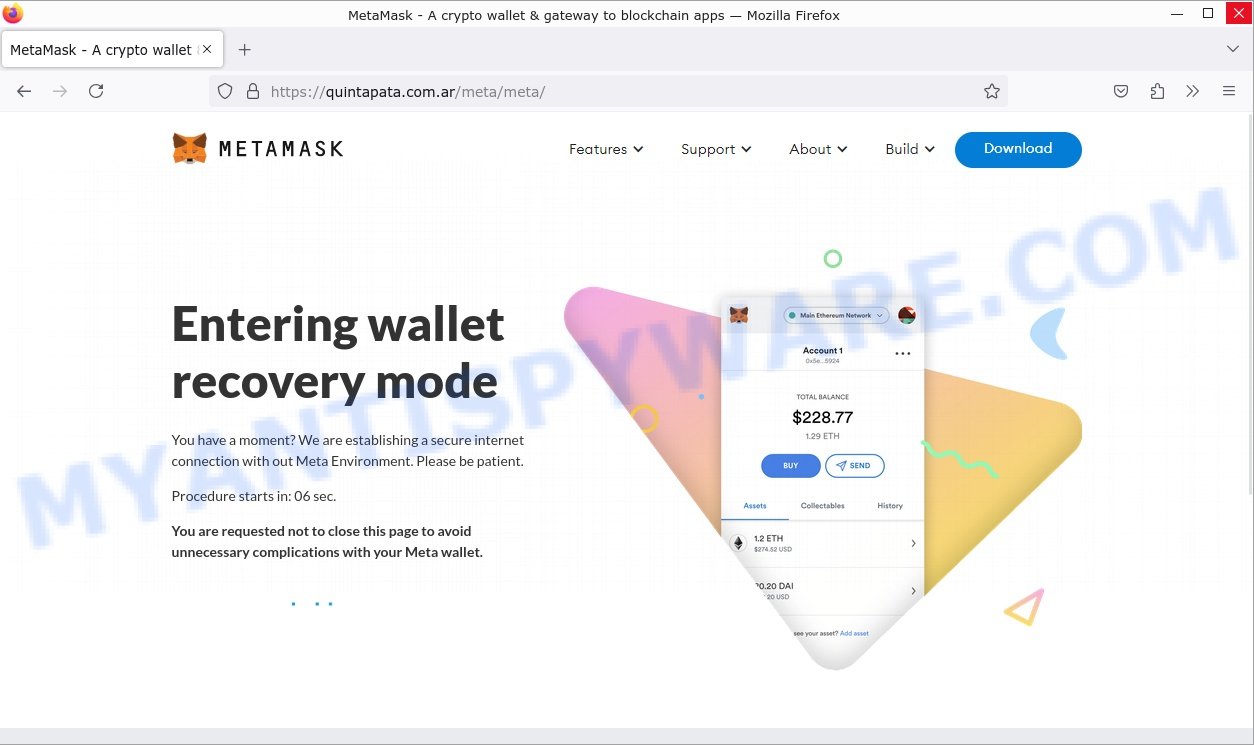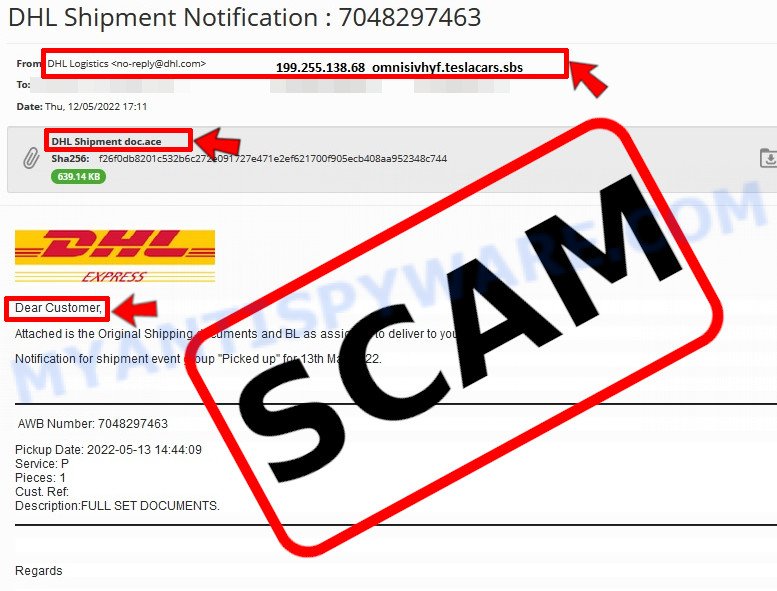Have you come across an email claiming to be from MetaMask about wallet verification, with an urgent subject saying, “Your MetaMask wallet will be suspended!”?
Question: Is this email and the website it links to legitimate, and should you follow their instructions to verify your wallet?
Investigation Findings: The email is a scam. It includes links to unrelated websites like “leadme.com.ar” and “quintapata.com.ar”, which are identified as phishing and malware threats by several security services. The scam aims to trick you into entering your MetaMask recovery phrase on their fake page, leading to potential theft of your crypto assets.
Quintapata.com.ar phishing website:

Answer: The MetaMask Wallet Verification Email is a fraudulent attempt to steal your wallet information. 💡 To protect yourself from scams like this, always check the sender’s email address and ensure URLs direct to the official MetaMask site, which is “metamask.io”. Never enter your wallet recovery phrase on any suspicious or unauthorized sites. Additionally, enable two-factor authentication wherever possible and stay informed about common phishing tactics.
MetaMask Wallet Verification Email Scam overview
The MetaMask Wallet Verification Email is a phishing attack pretending to be an official message from MetaMask about verifying your wallet. This scam tries to trick people into thinking their MetaMask account isn’t verified. It targets users’ trust by pretending to be a real notification from MetaMask.
A typical “MetaMask Wallet Verification Email” scam email reads as follows:
Subject: Your MetaMask wallet will be suspended!
#115232081 MetaMask .
MetaMask
Dear customer,
Our system has shown that your Metamask has not yet
been verified. This verification can be done easily on the page below.
Due to the new update of NFT’s & Coins, all unverified accounts will be suspended on Monday, October 28, 2024.
We’re sorry for any inconvenience we cause with this, but please keep in mind that our intention is to keep our customers safe and happy.VERIFY MY WALLET
Emails from this scam claim that users need to verify their account or it will be suspended soon. The email includes links like “VERIFY MY WALLET” which seem urgent and lead to fake websites such as quintapata.com.ar and leadme.com.ar. These sites mimic MetaMask’s look to catch people off guard.
If you open these links, they ask for sensitive info like your recovery phrase. Giving away such details can lead hackers to steal your wallet’s content.
Summary Table
| Name | MetaMask Wallet Verification Email Scam |
| Type | Email Phishing Scam |
| Target | MetaMask Wallet Users |
| Fake Destination | quintapata.com[.]ar, leadme.com[.]ar |
| Detected By | alphaMountain.ai, Combo Cleaner, Criminal IP, Lionic, SOCRadar, Cluster25, CRDF, CyRadar, Fortinet |
| Impersonated Brand | MetaMask |
| Common Tactics | Impersonation, Urgency, Fake Security |
📧 What to Do When You Receive the “MetaMask Wallet Verification Email” Scam Email
We advise everyone who receives this email to follow the simple steps below to protect yourself from potential scams:
- ❌ Do not believe this email.
- 🔒 NEVER share your personal information and login credentials.
- 📎 Do not open unverified email attachments.
- 🚫 If there’s a link in the scam email, do not click it.
- 🔍 Do not enter your login credentials before examining the URL.
- 📣 Report the scam email to the FTC at www.ftc.gov.
If you accidentally click a phishing link or button in the “” Email, suspect that your computer is infected with malware, or simply want to scan your computer for threats, use one of the free malware removal tools. Additionally, consider taking the following steps:
- 🔑 Change your passwords: Update passwords for your email, banking, and other important accounts.
- 🛡️ Enable two-factor authentication (2FA): Add an extra layer of security to your accounts.
- 📞 Contact your financial institutions: Inform them of any suspicious activity.
- 🔄 Monitor your accounts: Keep an eye on your bank statements and credit reports for any unusual activity.
🔍 How to Spot a Phishing Email
Phishing emails often share common characteristics; they are designed to trick victims into clicking on a phishing link or opening a malicious attachment. By recognizing these signs, you can detect phishing emails and prevent identity theft:

💡 Here Are Some Ways to Recognize a Phishing Email
- ✉️ Inconsistencies in Email Addresses: The most obvious way to spot a scam email is by finding inconsistencies in email addresses and domain names. If the email claims to be from a reputable company, like Amazon or PayPal, but is sent from a public email domain such as “gmail.com”, it’s probably a scam.
- 🔠 Misspelled Domain Names: Look carefully for any subtle misspellings in the domain name, such as “arnazon.com” where the “m” is replaced by “rn,” or “paypa1.com,” where the “l” is replaced by “1.” These are common tricks used by scammers.
- 👋 Generic Greetings: If the email starts with a generic “Dear Customer”, “Dear Sir”, or “Dear Madam”, it may not be from your actual shopping site or bank.
- 🔗 Suspicious Links: If you suspect an email may be a scam, do not click on any links. Instead, hover over the link without clicking to see the actual URL in a small popup. This works for both image links and text links.
- 📎 Unexpected Attachments: Email attachments should always be verified before opening. Scan any attachments for viruses, especially if they have unfamiliar extensions or are commonly associated with malware (e.g., .zip, .exe, .scr).
- ⏰ Sense of Urgency: Creating a false sense of urgency is a common tactic in phishing emails. Be wary of emails that claim you must act immediately by calling, opening an attachment, or clicking a link.
- 📝 Spelling and Grammar Errors: Many phishing emails contain spelling mistakes or grammatical errors. Professional companies usually proofread their communications carefully.
- 🔒 Requests for Sensitive Information: Legitimate organizations typically do not ask for sensitive information (like passwords or Social Security numbers) via email.
✅ Conclusion
We hope this article has helped you understand more about the “MetaMask Wallet Verification” Scam Email and how to avoid falling victim to scammers. If you have received a phishing email that is similar but not identical to the example above, please post it in the comments section of this article. This helps us warn other users about potential scams and improve our resources to protect you better. Stay safe and vigilant! 🛡️
















